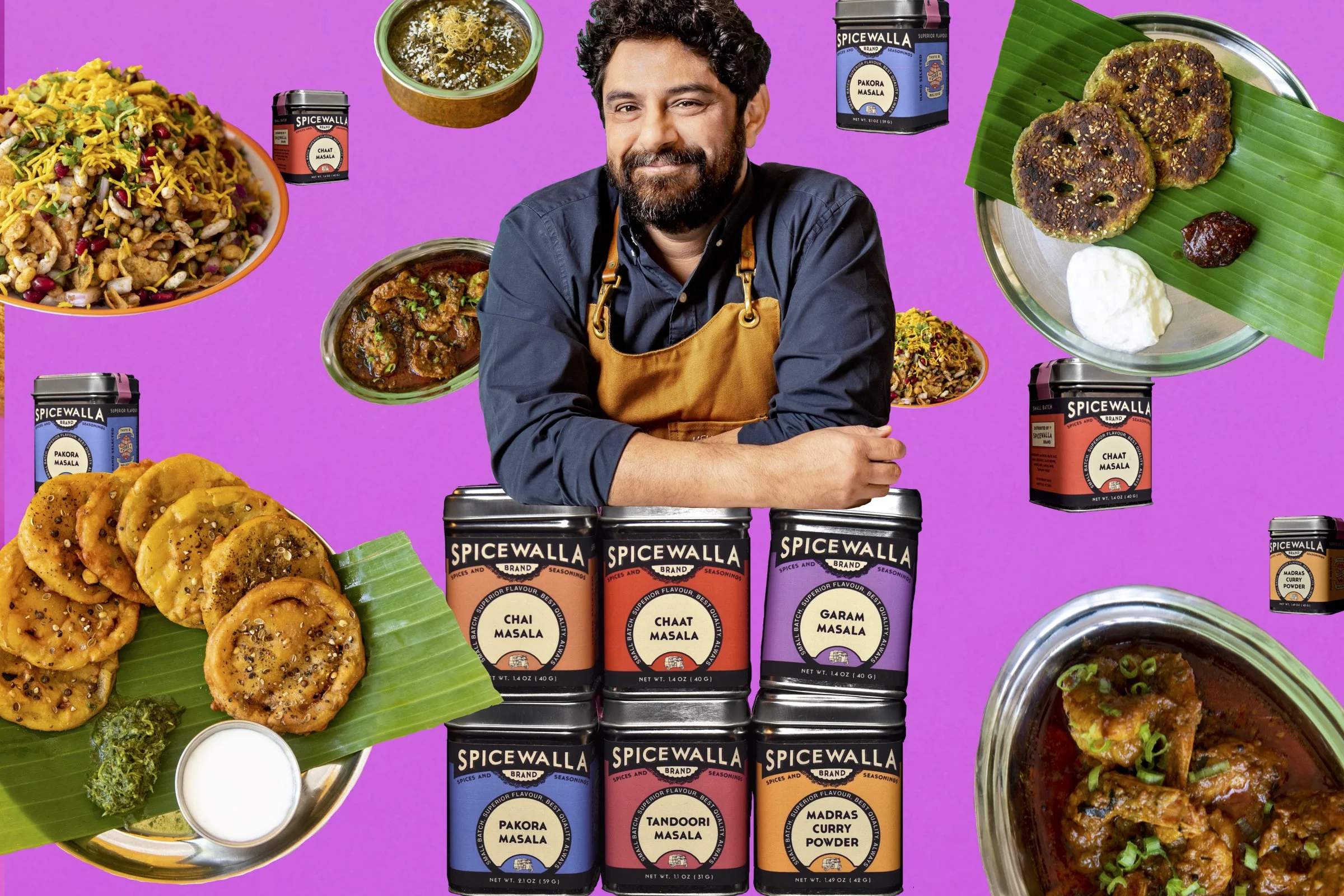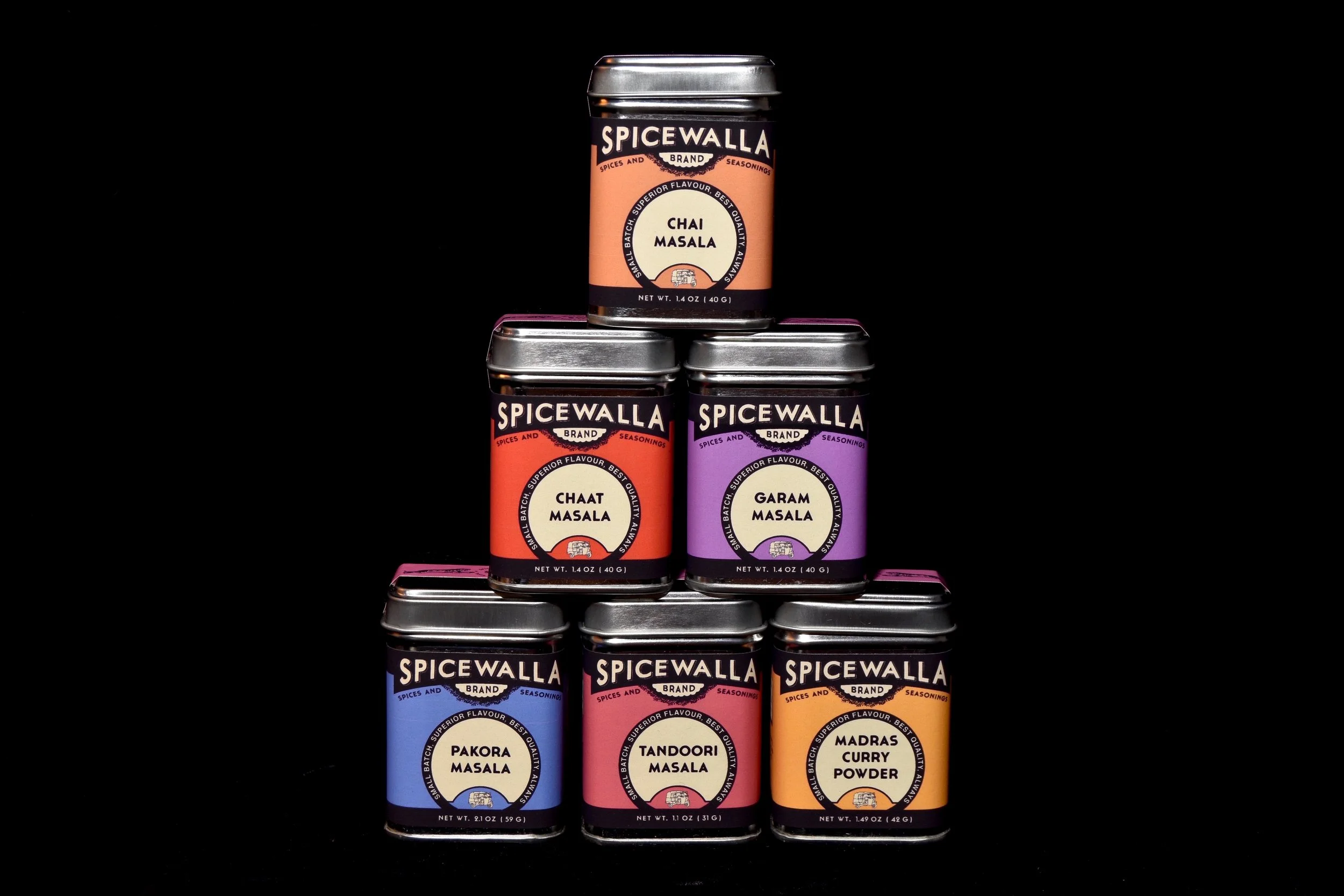From California Car Salesman to Five Time James Beard Nominee in Asheville, N.C.
With ‘Brown in the South’ Dinners, Chef and Spicewalla Owner Meherwan Irani is Part of the South’s New Image
Meherwan Irani is the co-owner of Chai Pani and Spicewalla, based in Asheville, North Carolina. Photo collage: Nina Roberts; food and human photos courtesy of Chai Pani.
Published on The Times of Entrepreneurship on December 27, 2021
Walk into Chai Pani in downtown Asheville, North Carolina: The smells of butter chicken thali, okra fries, vegetable uttapam, among other meals served on big, silvery platters fill the air. The vibrant, contemporary space is decorated with graphic murals, street art and photos rooted in India, where chef and co-owner Meherwan Irani grew up.
Chai Pani serves Irani’s own take on Indian street food. Irani and his wife Molly, opened Chai Pani in 2009 in the throes of the financial crisis as a back-up plan of sorts. He’d been working in high-end real estate development, which came to a standstill.
So how did Irani, who had also previously been a car salesman, transition from real estate, to owning and running eight restaurants across four southern cities and receiving five James Beard nominations?
His mom’s cooking.
“In my mind, she was a pioneer,” says Irani of his mom’s culinary innovations. Irani grew up in the 1970s a town outside Pune, India, on a family compound. When the family turned it into a bed and breakfast, his mother commandeered the kitchen and cooked for guests. Many were Westerners who came to discover the teachings of Meher Baba, a local guru who had died in the late 60s. (The ashram continues to attract visitors.)
“She started learning how to develop meals and cuisine that appealed to Western palates without dumbing down the food,” explains Irani, underscoring it wasn’t an East/West fusion, but rather bringing the best of both worlds together.
“Indian cuisine was just lighter, brighter, more innovative,” Irani adds.
But Irani kept his cooking at home while working in the auto and real estate industries, until opening Chai Pani. He’s since created the spice company Spicewalla and co-launched Brown in the South, a dinner series that highlights Indian chefs, restaurants and cuisines in the south. Irani spoke with The Times of Entrepreneurship about his adventures opening Chai Pani at the height of the financial crisis. The transition was often filled with incredulous laughter.
Nina Roberts: First, what brought you to the US?
Meherwan Irani: Graduate school, my MBA. I applied to a school in Columbia, South Carolina. We had family friends living in Myrtle Beach so my family figured I could visit them for holidays. When you’re looking at the map from India, they don’t look that far apart!
NR: And Myrtle Beach is where you met Molly, your wife and business partner?
MI: Exactly. I waited tables at a French bistro/patisserie over the summer. That’s where we met. We fell head over heels; I followed her to the Bay Area where she was going to college. I took one look at the city and said, “Why would I ever go back?”
NR: San Francisco is gorgeous. What did you do as a new transplant?
MI: I didn’t have a plan. I started to sell cars. Lexus. I thought I could make money and have the flexibility to finish my MBA.
I actually fell in love with the automotive industry. I became a car guy. I did really well! … As an Indian—I may be stereotyping a little bit—it feels like we come here with this entrepreneurial itch, and the auto industry scratched that that itch. It’s 100% commission-based.
NR: Were you cooking at home?
MI: The cooking started in grad school. After six months of just eating American junk food [laughs], I had to learn how to cook. I’d call my mom in India and ask her, how do I do this? Do that? I started paying attention and caught the bug.
California in the early 90s was going through its own culinary explosion. Alice Waters’s Chez Panissewas already up and running, Thomas Keller had just opened The French Laundry and “ethnic cuisine,” like Vietnamese, Thai and other Asian foods, were also undergoing a transformation in San Francisco. I’d become a foodie.
NR: How did you end up in Asheville?
MI: We couldn’t afford a home in the Bay Area, live within our means and raise our daughter the way we wanted to. Asheville, North Carolina, kept coming up as a place to live. All it took was a visit, it was instantly appealing: sort of progressive, people from all over the country, it’s beautiful, a great art scene.
We moved in 2005 and I worked in real estate development, getaway places way up in the mountains. Many of them featured private air strips, so, super high-end. I took to it like fish to water. … Molly was able to be at home. We bought our first home and everything seemed like it was going fabulously [laughs], until 2008 came around and the bottom fell out of the market.
I thought we could survive the crisis if I returned to the auto industry. But Molly asked this really pivotal question, “If you could pick that thing that you feel deep inside you were put on earth to do, what would it be?” I had been talking about how Indian food in America was at a turning point. Somebody needed to redefine what Indian food looked like—I was convinced I knew.
My initial thought was that opening a restaurant just seemed so hard—going to culinary school, raising money, learning about the restaurant business. But as I sat with it, I realized a few things.
I had absorbed my mother’s unique, self-taught style of cooking. There was no culinary school that could teach me Indian cuisine. Another realization. A restaurant is a business, a retail business. And I’m really good at retail—themarketing, branding and understanding what makes customers tick.
And, raising money? I actually know a lot of wealthy people.
NR: But it was such a tumultuous time in the economy.
Spicewalla’s Masalas. Photo: Nina Roberts
MI: I was convinced this was more about learning how to run a business, then some genius culinary concept. I confidently went to my bank with my business plan, figuring they’re going to be awed by the sheer detail of it, my MBA background, my retail sales—getting this money should be a cinch. Um, I mean [hearty laugh] I think they were really trying to be polite and not laugh.
NR: What did they find objectionable?
MI: They liked the plan, but said, “We’re in an economic crisis, nobody’s lending money.” I went to the SBA, same thing. I went to a local business incubator, same thing. So, in desperation, Molly and I wrote an open letter to all of our friends and family telling them what we were doing and asked to borrow money from them instead.
NR: Oh, like a seed round.
MI: Exactly! People started calling and emailing with $2,000, $5,000, $1,000, we roughly pieced together $70,000. We got lucky and found a space.
NR: How did you translate food you’d been cooking at home, to meals made for a restaurant?
MI: That was the part where I had no idea what I was doing. I called my mom.
I had hired young, talented American chefs and cooks, I taught them the parts of Indian cuisine I wanted them to understand. My mom did the rest [laughs]. She came over and spent three months with these 20-something, tattooed, you know, wanting-to-make-their-mark-in-the-culinary-world guys. Almost every one of them is still with the business all of 12 years later.
NR: When you opened, what was the reaction to an Indian street food restaurant?
MI: We had a line around the block on opening day. I think we were the first, avant-garde, if you will, culinary experience in Asheville that was bringing—and I’m using air quotes—an “ethnic experience” to Asheville. We had no idea there would be such an overwhelming demand and response.
NR: Were you able to pay those seed round people back?
MI: Oh, absolutely, and then some.
NR: Did you ever go back to any of those banks that didn’t lend you money and say…
MI: Yes, I had a little black notebook with their names in it—I’m joking! [laughs] I never took it personally, they weren’t saying no to me, they were saying no to what I was presenting to them at the time.
NR: You came to Chai Pani with more of a business background and approach, but you’ve been nominated for how many James Beard Awards?
MI: Five, I think, but who’s counting? [laughs]
NR: Fast forward, you now have a restaurant group and Spicewalla, a spice business.
MI: We started Spicewalla as a restaurant supplier, but when chefs started talking about it, putting it on their menus, folks started showing up at the factory, knocking on the door and saying, “Hey, we heard you sell spices.” We only had 20-pound bags. So we launched a retail line in the summer of 2019. Months later, Oprah Winfrey put our 18-pack on her list of her favorite things. The Spicewalla you see today is because that moment happened.
NR: Did your sales explode?
MI: Insane. And it was almost like Oprah primed us—we created our ecommerce platform in 30 days—for what was coming next. When the pandemic hit, our spice business went 4 X from 2019.
Over the pandemic it’s been bittersweet to watch one side of the business suffer, revenues dropped to 20-30% of what they used to be, our staff stressing. But on the flip side, Spicewalla was going nuts.
NR: What are your Brown in the South dinners?
MI: I realized the landscape of the American south was changing but not being talked about. What was being talked about in the news was still Charlottesville, confederate flags, monuments and pickup trucks, this whole, you know, legacy of the south.
But over the years, other Indian chefs have been opening really cool, forward thinking Indian concepts, all in the south. Maneet Chauhan opened Chauhan Ale and Masala House in Nashville. Vish [Vishwesh Bhatt] is a renowned chef at Snackbar in Oxford, Mississippi. Cheetie Kumar’s Garland was making waves in Raleigh, Asha Gomez in Atlanta…
I thought, I live here, do I not count as a southener? Maybe if we talked about our experiences, perceptions of the south would stop being so black and white, literally, not metaphorically, literally. So, Brown in the South is about having conversations around food with immigrants.
José Andrés dropped in on one dinner, because he happened to be in town; Michael Symon of came to Chai Pani to cook with me for his show. I used to watch these guys on TV, now I’m talking about my food with them! My family and I did the campy, “Allez cuisine!” from Iron Chef with Michael Symon, and it was just one of those perfectly validating moments. I realized, my God, what a journey I’ve been through.
This Q&A had been edited and condensed for clarity.

